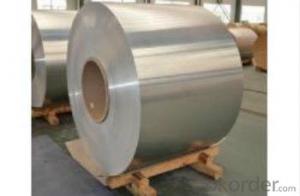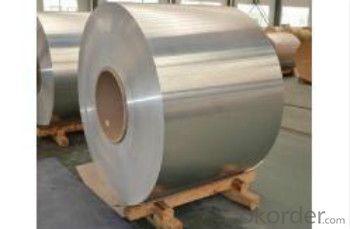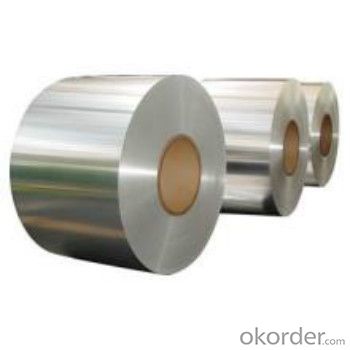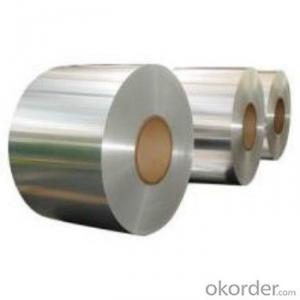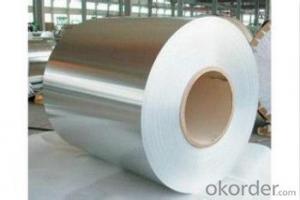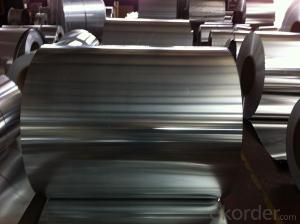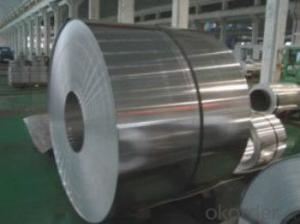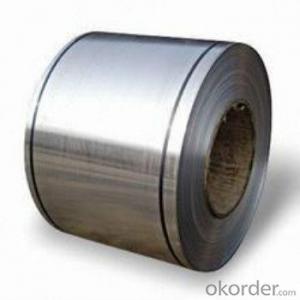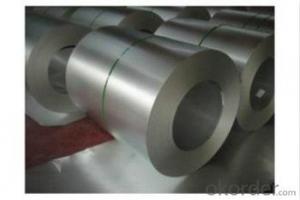1060 Aluminum Coils - Mill Finished Aluminum Coil AA1050 Temper H16
- Loading Port:
- Shanghai
- Payment Terms:
- TT or LC
- Min Order Qty:
- 3 m.t.
- Supply Capability:
- 3000 m.t./month
OKorder Service Pledge
OKorder Financial Service
You Might Also Like
Specification
1. Aluminum Coil Description:
Aluminum coil, is a rolled product, produced in a coiled form of continuous strip, and having an ID (Inner diameter) and OD (Outer diameter).Common alloy coil are used for a wide variety of applications, alloy 1050, 1060, 3003, 3105, 3005, 5052, 5754, 5083, 6061, 8011, 8021, and so on, in thickness from 0.0065-7mm, in width from 300- 2200mm.
2.Main Features of the Aluminum Coil:
• Great ductility
• Heat conductivity
• Anti-corrosion
• Moisture resistanve
3.Aluminum Coil Images
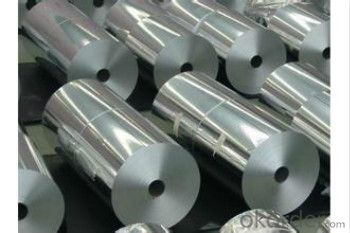
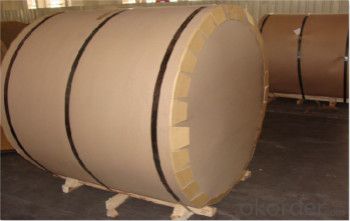
4.Aluminum Coil Specification
Aluminum Coil/Sheet | |
Main Specification | |
Alloy | AA1xxx (AA1050, AA1060, AA1070, AA1100 etc.) |
AA3xxx (AA3003, AA3004, AA3005, AA3105 etc.) | |
AA5xxx, AA6XXX (AA5052,AA5083, AA5754, AA6061, AA6062 etc.) | |
AA8xxx(AA8011, AA8006, AA8079 etc.) | |
Temper | H14,H16, H18, H22, H24, H26, H32,O/F |
Thickmess | ≥0.2mm |
Width | 30mm-2100mm |
Standard | GB/T 3880-2006 |
Special specification is available on customer's requirement | |
5.FAQ
We have organized several common questions for our clients,may help you sincerely:
(1) How to guarantee the quality of the products?
We have established the international advanced quality management system, every link from raw material to final product. we have strict quality test; we resolutely put an end to unqualified products flowing into the market. At the same time, we will provide necessary follow-up service assurance.
(2) MOQ?
For trail order, we accept 5 MT.
(3) Payment term?
30% deposit, balance against the BL copy; 100% L/C at sight
(4) What is the delivery time?
Depends on actual order, around 30 to 35 days
- Q: Can aluminum coils be customized in terms of thickness?
- Yes, aluminum coils can be customized in terms of thickness. The thickness of aluminum coils can be adjusted according to the specific requirements of a particular application. This customization is achieved through a process called aluminum coil slitting, where the original coil is cut into narrower coils of desired thickness. This allows for flexibility in meeting various needs and specifications of different industries.
- Q: How do you store aluminum coils to prevent damage?
- To prevent damage and store aluminum coils effectively, there are several important steps that can be taken. First and foremost, it is crucial to maintain a clean, dry storage area that is completely free from moisture and humidity. Moisture can gradually corrode the aluminum coils and cause significant damage over time. Secondly, it is advisable to store the coils in an upright position, preferably on pallets or racks, in order to avoid any bending or warping. By keeping them upright, the risk of coil deformation is minimized, ensuring that their shape remains intact for future use. Furthermore, it is recommended to shield the coils from dust, dirt, and other contaminants by covering them with a protective material such as plastic or tarp. This protective layer not only safeguards the coils from external particles but also isolates them from any potential chemical exposure that could accelerate corrosion. Additionally, it is of utmost importance to handle the coils with care during the storage process to prevent dents or scratches. Rough handling or accidental dropping can result in physical damage. Therefore, appropriate lifting equipment like forklifts or cranes should be used when moving or stacking the coils. Lastly, regular inspections should be carried out to check for any signs of damage or corrosion during storage. By conducting visual checks on a periodic basis, any issues can be identified early on, allowing for necessary interventions to prevent further damage. By adhering to these storage practices, damage to aluminum coils can be effectively prevented, ensuring their longevity and preserving their quality for future utilization.
- Q: What are the different packaging weights available for aluminum coils?
- The packaging weights available for aluminum coils vary depending on the specific requirements and applications. Aluminum coils can be packaged in a range of weights, typically measured in pounds or kilograms. The specific packaging weight will depend on factors such as the size and thickness of the coils, as well as the quantity required by the customer or industry standards. Common packaging weights for aluminum coils can range from as low as 500 pounds (or 227 kilograms) to as high as several thousand pounds (or several metric tons) for larger industrial applications. These weights ensure secure and efficient transportation and storage of the coils, while also allowing for easy handling and loading. It is important to note that the packaging weight of aluminum coils can be customized to meet specific needs. Manufacturers and suppliers often work closely with customers to determine the most appropriate packaging weight based on factors such as transportation requirements, storage space limitations, and industry regulations. Overall, the packaging weights for aluminum coils are flexible and can be tailored to suit individual needs, ensuring safe and convenient handling while meeting the demands of various industries.
- Q: Can aluminum coils be used in electrical conductors?
- Yes, aluminum coils can be used in electrical conductors. Aluminum is a good conductor of electricity and is commonly used in various electrical applications, including wiring, power transmission, and motor windings.
- Q: What is the weight of aluminum coils?
- The weight of aluminum coils can differ based on their specific dimensions and thickness. Nevertheless, the average weight of aluminum coils can span from a few hundred pounds to several thousand pounds. It is crucial to consider that the weight of aluminum coils can also be affected by factors like the composition of the alloy and any extra coatings or treatments applied to them.
- Q: What advantages does 0.1*100cm aluminum coil have? Is it suitable for the roof tiling? How is the anti-oxidation and anti-corrosion performance?
- 0.1 aluminum sheet has no intensity, so 0.5-1mm colored steel is often used to make roofing.
- Q: What are the potential applications of mill-finished aluminum coils?
- Mill-finished aluminum coils have a wide range of potential applications due to their versatile properties and finishes. Some of the potential applications of mill-finished aluminum coils include: 1. Building and construction: Mill-finished aluminum coils are commonly used in the building and construction industry for various applications. They can be used for roofing, siding, wall cladding, gutters, and downspouts, among others. The mill finish provides a clean and smooth appearance, enhancing the aesthetic appeal of the building while also offering durability and corrosion resistance. 2. Automotive industry: Mill-finished aluminum coils find applications in the automotive industry due to their lightweight nature, high strength-to-weight ratio, and corrosion resistance. They can be used for manufacturing body panels, trims, and other components, contributing to fuel efficiency and reducing the overall weight of vehicles. 3. Electrical industry: Mill-finished aluminum coils are used in the electrical industry for various applications. They can be used for manufacturing electrical enclosures, transformers, busbars, and conductors due to their electrical conductivity and corrosion resistance. The mill finish ensures a high-quality surface finish for these electrical components. 4. Packaging industry: Mill-finished aluminum coils are widely used in the packaging industry due to their excellent barrier properties and formability. They can be used for manufacturing aluminum foil, cans, lids, and other packaging materials. The mill finish provides a smooth surface, making it suitable for printing and branding purposes. 5. Household appliances: Mill-finished aluminum coils are used in the manufacturing of household appliances such as refrigerators, ovens, and air conditioners. They provide a lightweight and corrosion-resistant solution for these appliances, ensuring durability and energy efficiency. 6. Aerospace industry: Mill-finished aluminum coils find applications in the aerospace industry due to their lightweight nature and high strength. They can be used for manufacturing aircraft structures, interior components, and other parts. The mill finish provides a smooth surface, ensuring aerodynamic efficiency and reducing drag. 7. Marine industry: Mill-finished aluminum coils are widely used in the marine industry for various applications. They can be used for manufacturing boat hulls, decks, and other components due to their corrosion resistance and lightweight properties. The mill finish ensures a clean and polished appearance, enhancing the aesthetics of the vessel. Overall, mill-finished aluminum coils have numerous potential applications across various industries due to their versatile properties, including lightweight, corrosion resistance, formability, and aesthetic appeal.
- Q: How are aluminum coils tested for quality and performance?
- Aluminum coils are tested for quality and performance through a series of rigorous inspection processes. These tests aim to assess the mechanical, chemical, and physical properties of the coils to ensure they meet the required standards. One common test conducted is the visual inspection, where trained technicians examine the surface of the aluminum coils for any visible defects such as scratches, dents, or irregularities in shape. This step is crucial as it helps identify any cosmetic flaws that may affect the overall performance and quality of the coils. Another important test is the dimensional inspection, which involves measuring the thickness, width, and length of the coils to ensure they meet the specified tolerances. This test is critical as it helps guarantee the coils will fit properly in their intended applications and perform optimally. To assess the mechanical properties, various mechanical tests are conducted. One such test is the tensile strength test, which measures the maximum amount of stress a coil can withstand before breaking. This test helps determine the strength and durability of the coils under different operating conditions. Additionally, the hardness test is performed to evaluate the resistance of the coils to indentation or scratching. This test provides insights into the coil's ability to withstand wear and tear, ensuring its longevity. Chemical analysis is another vital aspect of quality testing. The chemical composition of the aluminum coils is examined to ensure it meets the required standards and does not contain any impurities or elements that may compromise the performance or safety of the coils. Furthermore, to assess the thermal properties of the coils, thermal conductivity tests are conducted. These tests measure the coil's ability to conduct heat efficiently, ensuring that it can effectively dissipate heat in applications where it is used. In addition to these tests, other performance evaluations may be conducted depending on the specific application of the aluminum coils. This could include corrosion resistance tests, fatigue tests, or even electrical conductivity tests. These evaluations help determine the coil's ability to perform under different conditions and ensure its reliability and longevity. By subjecting aluminum coils to these comprehensive quality and performance tests, manufacturers can ensure that only the highest quality coils are delivered to customers, meeting their expectations and standards.
- Q: What are cold rolled aluminum coils and hot rolled aluminium coils, what are their respective features?
- Each has its advantages and disadvantages.Cold rolling mainly deals with non thermal strengthening of sheet metal. Generally, the surface requirement is relatively high, and the ultra-thin materials such as single zero foil, double zero foil and so on can only be rolled by cold rolling.
- Q: What are the different types of aluminum coils?
- There are several different types of aluminum coils, including plain aluminum coils, painted aluminum coils, embossed aluminum coils, and coated aluminum coils. Each type has specific properties and uses, making them suitable for different applications in various industries.
Send your message to us
1060 Aluminum Coils - Mill Finished Aluminum Coil AA1050 Temper H16
- Loading Port:
- Shanghai
- Payment Terms:
- TT or LC
- Min Order Qty:
- 3 m.t.
- Supply Capability:
- 3000 m.t./month
OKorder Service Pledge
OKorder Financial Service
Similar products
Hot products
Hot Searches
Related keywords
